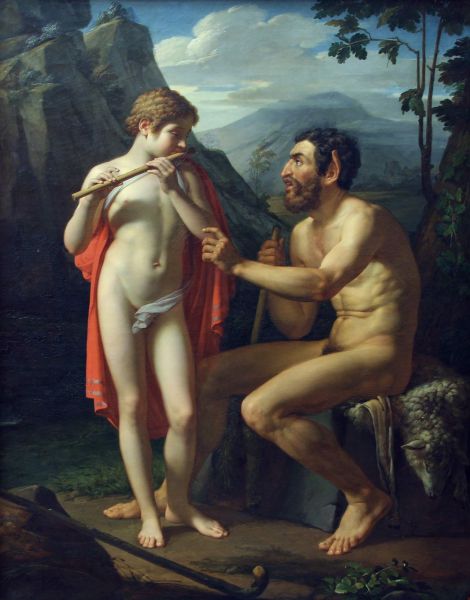|
|
Faun Marsyas Teaches Olympus to Play the Flute. 1821

Basin Pyotr,
Oil on canvas
185 x 139,5
State Russian Museum
Пост. в 1897 из МАХ, где находилась с 1824
Annotation
A Herculaneum fresco of the same name gave Basin the idea of the subject for the painting. One day, wandering through the fields of Phrygia, Faun Marsyas found a reed flute. It was thrown away by the goddess Athena, who noticed that the game on the flute of her own invention disfigures her divinely beautiful face. Athena cursed her invention, saying that the one to pick up the flute would be severely punished. Not knowing the words of Athena, Marsyas picked up the flute and soon learned to play it so well that everyone fell in love with this unpretentious music. Marsyas became too proud and threw the gauntlet to the patron of music Apollo himself. Apollo took his challenge. Marsyas could not make the flute’s sound so wondrous as was the music that flew from the golden strings of the cithara owned by Apollo the leader of the muses, – so Apollo won. Angry with the faun’s defiant challenge, Apollo ordered to hang the unfortunate Marsyas by the hands and skin him. Thus Marsyas paid for his hubris. His skin was hung in a grotto in Phrygia, and it was told that it always began to move, as if dancing, when the sounds of a Phrygian reed flute reached the grotto, and remained motionless when the majestic sounds of a cithara were heard.
Author's Biography
Basin Pyotr
1793, St Petersburg — 1877, St Petersburg
Painter, author of religious, historical and landscape compositions, monumentalist, engraver. Born to the family of a Petersburg civil servant. Attended the drawing classes at the Imperial Academy of Arts (from 1811). Awarded minor and major silver medals (1813). Studied painting under Vasily Shebuyev (from 1816). Lived in Italy (1819–1930). Returned to St Petersburg in 1830. Academician of painting (1831). Second-class professor (1836), first-class professor (1846), professor emeritus (1856). Professor of the Academy of Arts (till 1869).

